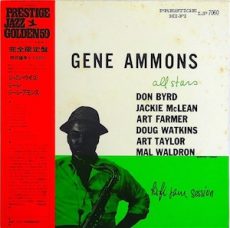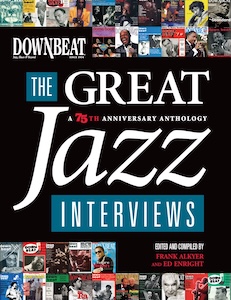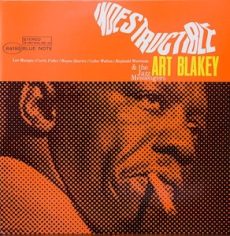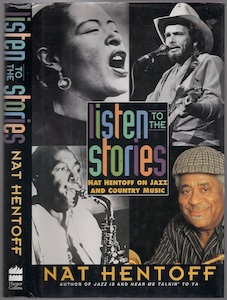
Requisites
Jammin’ With Gene ~ Gene Ammons All-Stars | By Eddie Carter
A few evenings ago, after dinner, I was enjoying a good book when I suddenly craved some jazz with a tenor sax. That decision led me to today’s discussion. Upon going to the shelf, I rediscovered one of my favorite records by the Gene Ammons All-Stars. “Jammin’ With Gene” (Prestige PRLP 7060) was the tenor saxophonist’s third release as a leader when it hit the stores in 1956. It was also the second of seven blowing session albums he recorded forthe label. The personnel for this date is a stellar supporting cast: Art Farmer and Donald Byrd on trumpet, Jackie McLean on alto sax, Mal Waldron on piano, Doug Watkins on bass, and Arthur Taylor on drums. My copy of this album is the 1977 Victor Musical Industries Japanese mono reissue (Prestige VIJ-5039).
The first side opens with the title tune, Jammin’ With Gene, by Gene Ammons. From the start, the septet establishes a cohesive atmosphere, with the front line delivering the melody in tight, harmonious unison. Gene takes the lead solo, slipping into a soulful groove that floats effortlessly over the rich foundation provided by his fellow musicians. Donald steps in next, his interpretation unfolding with increasing intensity, from a gentle warmth to a robust climax, also with the front line shadowing him. Art and Jackie then state their cases in the subsequent two readings, each presentation adding a fresh layer of expression. Mal wraps things up with a laid-back performance, which is followed by the group circling back to their unified closing chorus.
The album’s only standard, We’ll Be Together Again, by Carl Fischer and Frankie Laine, opens gently as Gene, Mal, and Doug’s introduction segues into a subtle, slow-moving melody by Ammons. Gene then steps forward, launching the opening statement with a smooth, relaxed swing. Art follows, infusing the second reading with vivacious energy, and then Jackie picks up the rhythm with lively, enthusiastic lines. Donald delivers the goods on the following interpretation, after which Mal ushers in a flowing groove leading into Gene’s closing passage back into a ballad tempo for the group’s graceful finish.
The album’s finale, Not Really The Blues by Johnny Mandel, is a lively, up-tempo tune that takes off with a brisk melody from the whole ensemble. Donald leads off, delivering a spirited statement that sets the pace, then Jackie adds some bite with sharp, energetic phrasing. Art keeps the momentum high with his vigorous contribution, while Gene steps in with high-octane in the next solo. Mal keeps things simmering with his smooth piano work, paving the way for a rapid-fire exchange among Farmer, Byrd, McLean, and Ammons. The excitement builds as Donald, Jackie, Art, and Gene trade choruses in a heated musical conversation, driving the group toward a swift and exhilarating exit.
Bob Weinstock supervised the session, and Rudy Van Gelder was responsible for the recording duties. This reissue’s sound quality is a delight to hear, with a vivid soundstage that transports the musicians to the sweet spot in your listening room. If you’re a Gene Ammons fan and appreciate a good bop album, I happily recommend “Jammin’ With Gene” by the Gene Ammons All-Stars for a spot in your library. It’s an underrated, but excellent album that every tenor sax enthusiast should seek out on their next record-shopping trip!
~ We’ll Be Together Again – Source: JazzStandards.com
© 2025 by Edward Thomas Carter
More Posts: choice,classic,collectible,collector,history,instrumental,jazz,music,saxophone

On The Bookshelf
Downbeat: The Great Jazz Interiews: 2009 | Frank Alkyer & Ed Enright
In honor of its 75th anniversary, publisher Frank Alkyer, with the assistance of the magazine’s editors past and present, has combed through the vast DownBeat archives and assembled a compendium of the magazine’s most celebrated, historical, and groundbreaking features, in-depth interviews, insights, classic photographs and magazine covers from the illustrious history of the world’s top jazz magazine, DownBeat.
This anthology includes the greatest of DownBeat‘s Jazz Hall of Famers: from early legends like Jelly Roll Morton, Louis Armstrong, Count Basie, Duke Ellington, and Benny Goodman; to bebop heroes like Charlie Parker, Dizzy Gillespie, John Coltrane, Sonny Rollins, and Miles Davis; to truly unique voices like Ornette Coleman, Cecil Taylor, Thelonious Monk, and Rahsaan Roland Kirk; to the pioneers of the electric scene like Chick Corea, Herbie Hancock, Pat Metheny, and Joe Zawinul.
The Great Jazz Interviews delivers the legends of jazz, talking about America’s music and America itself, in their own words. At times this collection reads less like a book and more like a conversation about jazz among the artists themselves.

Requisites
Indestructible! ~ Art Blakey and The Jazz Messengers | By Eddie Carter
For over three decades, Art Blakey made an indelible mark on jazz, both as a dynamic drummer and a visionary band leader. His creative drive propelled The Jazz Messengers to the forefront of the jazz world, earning them international acclaim as one of the genre’s premier ensembles. By 1964, the group was facing a turning point: Wayne Shorter was preparing to leave for the Miles Davis Quintet, and both Cedar Walton and Reggie Workman were set to embark on solo careers. This week’s featured album from the library is Indestructible (Blue Note BLP 4193/BST84193), Blakey’s final session for Blue Note. Intriguingly, the album wasn’t released until 1966, making its debut with a powerful, unforgettable presence.
Art is accompanied by Lee Morgan on trumpet, Curtis Fuller on trombone, Wayne Shorter on tenor sax, Cedar Walton on piano, and Reggie Workman on bass. My copy of the album is the 1985 Toshiba-EMI Limited Japanese stereo reissue utilizing the original catalog number. The Egyptian, by Curtis Fuller, which opens the first side, sets the tone with a relaxed, mid-tempo beat. The trio’s lengthy conversation leads to the front line’s irresistibly catchy melody. Curtis goes to work first, establishing a laid-back mood, then Wayne provides the song’s most dventurous solo, which nearly steals the spotlight. Lee injects a burst of energy into a swinging improvisation next. Finally, Cedar wraps up things with a superb statement, leading to the ensemble’s ending theme and fadeout.
Curtis Fuller’s Sortie opens with a blues-inspired introduction, drawing the ensemble into a smooth, medium-tempo melody. Lee begins the opening solo impressively, then Wayne executes a soulful, down-home statement. Curtis steps in with a lively, toe-tapping reading next, after which Cedar presents his ideas on the final performance perfectly until the group comes to a graceful closing chorus and gentle fade. On the second side, Calling Miss Khadija by Lee Morgan starts with Reggie, Cedar, and Art, setting the lively mood for the track’s vivacious theme. Lee ignites the opening statement with his energetic playing. Wayne continues the momentum with swinging, expressive lines. Curtis then delivers a solo rooted in blues, leading into Cedar’s scintillating reading, followed by Art’s brief but memorable presentation, before the ensemble’s closing chorus softly dissolves.
When Love Is New by Cedar Walton is a gorgeous ballad that begins with the ensemble’s unified introduction, then gives way for Wayne to shape the beautiful melody and a sprightly, breezy lead solo. Lee follows with an easy swing in his tone and a steady sureness until the saxophonist returns to pilot the group back to the closing chorus and a soft summation. Mr. Jin by Wayne Shorter showcases his knack for weaving an intricate, adventurous melody with an
Oriental flavor. Art sets the tone for the ensemble’s precise interplay, then Wayne steps up first with ample room to stretch out on the opening statement. Lee responds to the saxophonist with bright, lively phrases, leading back to the sextet’s theme reprise and the trio’s slow fadeout.
The chemistry among the musicians on Indestructible is truly remarkable. Art Blakey created a space where creativity flourishes and daring improvisation thrives. This approach yields performances with vibrant energy, yet remains disciplined and refined. Every member of the ensemble is given room to shine individually without ever losing their unmistakable coherence. Lee Morgan’s trumpet stands out with vibrant flair, while Curtis Fuller’s trombone adds a rich, soulful layer. Wayne Shorter’s tenor saxophone brings an alluring, mysterious edge. At the heart of the ensemble, Cedar Walton and Reggie Workman provide a steadfast and fluid foundation of rhythms and harmonies, completing what stands as one of the finest incarnations of the Jazz Messengers under Art’s leadership.
Alfred Lion produced the album, and Rudy Van Gelder was behind the recording console. The sound quality of this Toshiba-EMI reissue is absolutely stunning, with a superb soundstage that transports the listener to the studio as the musicians play. If you’re already a fan of Art Blakey and The Jazz Messengers, or simply in the mood for some hard bop to unwind after a long day, I highly recommend checking out Indestructible on your next record-shopping trip. It’s an outstanding album that promises countless hours of rewarding listening. Additionally, as Art Blakey’s swan song for the label and the three departing members, it is sure to be cherished by both newcomers and seasoned fans alike!
© 2025 by Edward Thomas Carter
More Posts: choice,classic,collectible,collector,drums,history,instrumental,jazz,music

On The Bookshelf
Listen To The Stories
Nat Hentoff has been listening to jazz, blues, country, and gospel since he was eight years old and tuned in (under the bedsheets) to Fats Waller broadcasting from Chicago’s Hotel Sherman during the Depression – and he has been writing about it nearly ever since, with ever-increasing passion.
This new book is the fruit of long nights of listening to, watching, traveling and talking with, and knowing firsthand jazz musicians and country and gospel singers from all over the nation – a book of truly American originals.
In this 220 page collection of stories he writes poignant descriptions of the early days of Roy Eldridge, the last years of Billie Holiday and Bird. He chronicles accounts of Duke, the Count, and Dizzy. Listen to the Stories covers new recordings and old legends, remarkable lives and unforgettable music.

Requisites
One of the best things I love about jazz is the discovery of old and new songs, classic and new artists, and bands with which I am not familiar. On one occasion, I visited Evolution Home Theater in Buckhead for the Atlanta Audio Club meeting and had the pleasure to meet and hear jazz vocalist Lyn Stanley. She treated the members to selections from her sixth LP, London Calling: A Toast To Julie London (A.T. Music, LLC – ATM 3107), and discussed how the album was recorded. This 2019 two-record release pays homage to the talented actress, jazz, and pop vocalist with other surprises. My copy used in this report is the limited edition, numbered 33 1/3 Stereo audiophile release.
She’s heard here with nine exceptional musicians; Mike Garson (tracks: A1, A2, A4, B1, B4 to C3, D2 to D4), Christian Jacob (tracks: B3, D1) on piano, John Chiodini (tracks: A1, A2, A4, D3) on guitar, Chuck Berghofer (tracks: A3 to B3, C3 to D1, D3), Mike Valerio (tracks: A1, A2, B1, B5 to C4, D2) on double bass, Paul Kreibich (tracks: A1, A2, B1, B4, C1 to C3, D2) on drums, Aaron Serfaty (A1, A2, A4, B1, B3 to D2) on drums, percussion, Luis Conte (track: C1), Brad Dutz (tracks: A1, A2, B1, B3, B4, C1 to C3, D1, D2) on percussion. What is unique about the album is that each song was recorded only once without any formal arrangements whatsoever, only chord charts with the musical roadmap created by Lyn and the band during the working demo sessions.
Ms. Stanley opens the album with an upbeat rendition of the 1936 song, Goody Goody by Matty Malneck and Johnny Mercer. The lyrics depict a woman getting her revenge on the man who hurt and left her and has now had the tables turned on him. It first appeared on Julie Is Her Name, Volume 2 (1958). Lyn beautifully expresses the song’s lyrics with a lively rendition of the opening and closing melody. Chiodini, Garson, and Valerio also add three spirited concise comments that swing freely. Call Me Irresponsible by Jimmy Van Heusen and Sammy Cahn is from Julie’s LP, The End of The World (1963). This tune shows Lyn is an inspired stylist as she cruises smoothly through the melody with artful simplicity. Chiodini and percussionist Brad Dutz appear at the introduction and finale with Garson, Valerio, and Serfaty providing a solid foundation throughout her presentation.
Bye Bye Blackbird was composed in 1926 by Ray Henderson and Mort Dixon. This song appeared on Julie (1958) and is a slow-tempo duet by Lyn and Chuck. Both vocalist and bassist complement each other in one of the most beautiful renditions I have ever heard. Lyn’s voice is soft and sweet matching Chuck’s bass walking tenderly on a short statement with his sensitive support to her vocals into a tranquil finale. I Heard It Through The Grapevine by Barrett Strong and Norman Whitfield is a Soul classic. It was a hit for Gladys Knight & The Pips on Everybody Needs Love (1967), Smokey Robinson & The Miracles on Special Occasion, and Marvin Gaye on In The Groove (1968). Lyn’s sultry interpretation about hearing a lover’s plan to leave their significant other from someone else is an excellent illustration of how she transforms this straightforward melody into a chillingly unique performance. Chiodini, Garson, Berghofer, and Serfaty provide the slowly rocking beat for her to tell the story.
Side Two starts with a 1928 song from the pen of Irving Berlin, How About Me? Ms. London introduced it on Around Midnight (1960) and the lyrics describe a display of regret and sadness for the loss of someone loved. The tempo moves to a medium beat for Lyn who kicks off the solo sequence with flawless enunciation, followed by Garson and Chiodini who split a perfectly constructed chorus. Cry Me A River by Arthur Hamilton was Julie’s first and biggest hit, making its debut on Julie Is Her Name (1955). It remained her signature song throughout her singing career. Like Ms. London’s version, a trio release featuring Barney Kessel on guitar and Ray Leatherwood on bass, Lyn is accompanied by John and Chuck who are the lush foundation behind her deeply affecting vocals. Chiodini also gives a passionately poignant reading before the trio’s tender climax.
As Time Goes By is songwriter Herman Hupfield’s most well-known composition. It premiered in the Broadway musical, Everybody’s Welcome (1931), but is best known as the song featured in the romantic drama, Casablanca (1942). Julie’s rendition first appeared on Our Fair Lady (1965). The ensemble’s version possesses a Bossa Nova flavor by the musicians and Lyn infuses the lyrics with a cheerfully happy tone, resulting in a delightful vocal interpretation. Christian and John match Ms. Stanley with two mellow statements that move along sprightly off the easy-going drive of Chuck’s bass, Aaron’s drums, and Brad’s percussion.
The first of two vocals of the timeless classic Summertime (1934) by George and Ira Gershwin and DuBose Heyward concludes both records. The song first appeared in the opera, Porgy & Bess (1935). Heyward wrote the lyrics based on his 1925 novel Porgy and it is sung as a mother’s lullaby to her baby. To date, the standard has over twenty-five thousand recordings. It is beloved by jazz musicians and vocalists worldwide and considered one of the greatest songs ever written. Julie sang it on Feelin’ Good (1965). Lyn and the quintet preserve the spirit of the song as a seductive slow tempo southern styled blues and her delivery of the lyrics are alluringly tender and expressive. John and Chuck take the spotlight, leading the quintet through one enchanting chorus preceding the bewitchingly beautiful ending.
Side Three starts with the Latin pop song It’s Impossible by Mexican songwriter Armando Manzanero who recorded it under the original title Somos Novios for his album, Somos Novios…Siempre Novios (1968). It was composed as an instrumental ballad. American composer and songwriter Sid Wayne added English lyrics two years later and it became a huge hit for Perry Como as the title tune of his album (1970). Lyn presents the lyrics with tender beauty and warmth while serenaded by Chiodini who plays a Spanish guitar and has a gentle solo as well. Berghofer and percussionists Conte and Serfaty provide the lush background behind Ms. Stanley’s delicate delivery.
Richard Rodgers and Lorenz Hart’s popular song Blue Moon (1934) was composed as The Bad In Every Man for the crime film, Manhattan Melodrama with different lyrics. After the film’s premiere, Hart eventually wrote more romantic lyrics for the song, and it has been a successful standard since two 1949 hit records by Billy Eckstine and Mel Tormé. Blue Moon opens Julie’s album, Julie Is Her Name, Volume 2 and in the version presented here, Lyn sings the lyrics sensuously at a slower tempo than Ms. London, blending superbly with John who provides a marvelous interpretation enhancing one of the prettiest tunes on the album.
George and Ira Gershwin contribute another jazz classic with Lyn’s version of I’ve Got A Crush On You. This song appeared in two different Broadway musicals, Treasure Girl (1928) and Strike Up The Band (1930). The vocal became a standard after renditions by Ella Fitzgerald, Frank Sinatra, and Sarah Vaughan. Ms. London featured it on Nice Girls Don’t Stay For Breakfast (1967). Lyn captures the melody perfectly with a warm, sincere interpretation and the song is perfect for couples to slow dance to. Chiodini answers her vocals with an impressive chorus backed by Garson, Berghofer, Kreitbich, and Serfaty preceding an intimately romantic conclusion.
Light My Fire was the first huge hit for the American Rock band, The Doors, first appearing on their debut release (1967). The song was a collaborative effort by Jim Morrison, Ray Manzarek, Robby Kreiger, and John Densmore. It appeared on Julie’s final studio album of Pop and Rock songs, Yummy, Yummy, Yummy (1969)! Lyn’s sultry voice caresses each word of the lyric with sensuous pleasure to John’s Flamenco flavored guitar playing, Aaron’s incredibly perfect percussion work, and Mike’s passionately powerful piano cascades that speak voluptuously.
Sway by Norman Gimbel and Pablo Beltran Ruiz appeared on Julie London Sings Latin In a Satin Mood (1963). The rhythm section’s gentle beat serves as a backdrop through the seductively, poignant introduction. Lyn’s tender, expressive opening, and closing vocals are immensely touching as Chiodini’s thoughtfully constructed reading of velvety-soft phrases. Lyn treats us to two beautiful melodies next; Go Slow by Debbie Kronck and Russell Garcia which appeared on Julie’s album, Make Love To Me (1957) and Nice Girls Don’t Stay For Breakfast by Bobby Troup and Jerome Leshay!
On the first tune, her bewitchingly lusty lyrics are the spark for a romantic evening ahead with the assistance of Chiodini, Serfaty, and Dutz who provide the gentle rhythm as she sings. Mike Valerio’s bass sets the mood perfectly for Lyn’s swinging interpretation of the second song’s lyrics illustrating her skillful phrasing into a subtle climax. You, The Night and The Music by Arthur Schwartz and Howard Dietz, premiered in the Broadway musical comedy, Revenge With Music (1934). Julie sang this timeless standard on her album, Around Midnight (1960). Lyn paints a compelling portrait of the lyrics as a Tango, making it her own with a unique delivery to a superbly done danceable beat. Garson matches the vocalist with an exquisite contribution sustained by the rhythm section’s rich accompaniment.
Ev’ry Time We Say Goodbye (1944) is one of Cole Porter’s most beautiful compositions from The Great American Songbook. It first appeared in Billy Rose’s musical revue Seven Lively Acts. This is a trio number with Lyn opening with an enchantingly vocal presentation possessing a deep romantic affection for the lyrics. Her bandmates Chiodini has a voluptuously gorgeous guitar solo and Berghofer matches the delicate softness of her tone with a tender bass beat, resulting in a stunningly perfect rendition. The finale is the second version of Summertime, this time a duet with Lyn and Mike. This tune opens with the pianist’s very pretty introduction capturing the beauty and sensitivity of the song into Lyn’s vocals which weaves a spell of love and intimacy in a style distinctively her own, completing the stories she and her colleagues tell so convincingly.
Lyn and John Chiodini produced the album and the men responsible for the excellent engineering on all the songs except It’s Impossible are Rouble Kapoor and Steve Genewick. Spencer Garcia was the engineer on It’s Impossible. The mastering is by Bernie Grundman of Bernie Grundman Mastering. Allen Sides of Ocean Way Recording is the mixing engineer, and the record was pressed at RTI (Record Technology Incorporated). The sound quality is stunning with a very realistic soundstage of Lyn’s vocals and the musicians’ instruments. If you have a mid-fi or high-end audio system, the music emerges from your speakers vibrantly transporting you into the studio alongside Lyn and the musicians.
Now that I have had the pleasure of hearing Lyn Stanley, I look forward to picking up the other albums in her discography. London Calling: A Toast To Julie London is a record that has it all, superb vocals, engaging compositions, excellent musicians, and a great sound that should be heard in its entirety to be fully appreciated. For those in search of fine jazz singing, I offer for your consideration London Calling: A Toast To Julie London by Lyn Stanley. A great collection of standards and abundant music for the money that once heard should earn her lots of new fans!
~ Around Midnight (Liberty LRP 3164/LST-7164), Everybody Needs Love (Tamla SM-706/SS-706), Feelin’ Good (Liberty LRP-3416/LST-7416), In The Groove (Tamla T-285/TS-285), Julie (Liberty LRP 3096/LST 7004), Julie Is Her Name (Liberty LRP 3066/LST 7027), Julie Is Her Name, Volume 2 (Liberty LRP 3100/LST 7100), Julie London Sings Latin In a Satin Mood (Liberty LRP-3278/LST-7278), Make Love To Me (Liberty LRP 3060/LST-7060), Nice Girls Don’t Stay For Breakfast (Liberty LRP-3493/LST-7493), Our Fair Lady (Liberty LRP 3392/LST-7392), Special Occasion (Tamla S-290/TS-290), Somos Novios…Siempre Novios (RCA Victor MKL-1785/MKS-1785), The Doors (Elektra EKL-4007/EKS-74007), The End of The World (Liberty LRP-3100/LST-7300), Yummy, Yummy, Yummy (Liberty LST-7609) – Source: Discogs.com
~ As Time Goes By, Blue Moon, Bye Bye Blackbird, Ev’ry Time We Say Goodbye, Summertime, You, The Night and The Music – Source: JazzStandards.com ~ Call Me Irresponsible, Cry Me a River, Goody Goody, How About Me, I Heard It Through The Grapevine, It’s Impossible, I’ve Got a Crush on You, Light My Fire, Sway – Source: Wikipedia.org © 2021 by Edward Thomas Carter
More Posts: choice,classic,collectible,collector,history,instrumental,jazz,music




